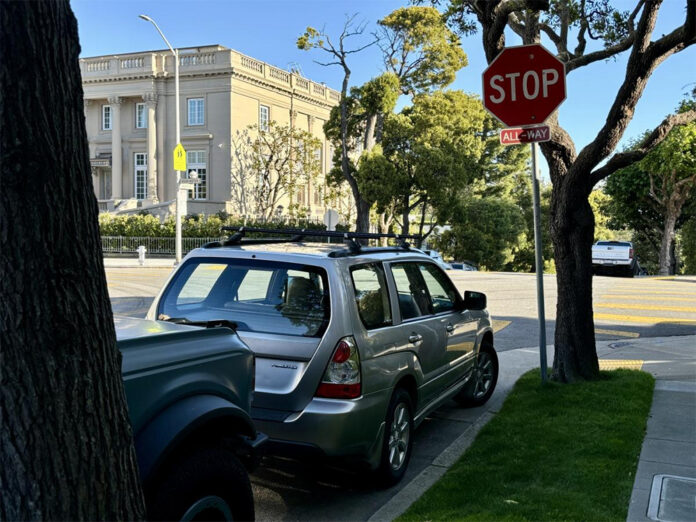by Marvin Ramírez
The City of San Francisco has escalated its crackdown on drivers, implementing controversial measures that critics say prioritize revenue and ideology over residents’ daily needs. From transforming residential parking into metered zones to closing parts of Highway 1, these policies are leaving citizens scrambling for solutions in their already hectic lives.
At a heated community meeting on Monday, November 11, the San Francisco Municipal Transportation Agency (SFMTA) unveiled a proposal to replace free parking with paid meters across Marina and Cow Hollow neighborhoods. The meeting drew a crowd of frustrated residents and business owners who accused the city of using parking as a cash grab or, worse, treating citizens as a financial piggy bank.
“I’m livid. I’m upset beyond belief,” said Marina resident Mike Najjar, 60, who has lived in the area for 35 years. “They’re doing it to cover up their budget shortfalls.”
Under the plan, the affected area spans major streets like Lombard and Van Ness Avenue, potentially disrupting daily life for thousands. Linda Reda, a senior resident, fears the changes will make it harder for locals to park near their homes while enabling bar patrons and visitors to monopolize spaces.
Business owners like Linda Kha, who operates Carats & Stones on Union Street, worry about the economic toll. “It’s very unwelcoming,” Kha said, expressing concerns about losing customers and imposing additional costs on staff unable to afford all-day parking.
For many, these measures seem like a blunt abuse of power and a lack of consideration for hard-working citizens who rely on their vehicles to navigate an already challenging urban landscape.
City officials, however, argue the changes are about improving parking availability rather than boosting the agency’s coffers, despite the $6 million in projected annual revenue. Raynell Cooper, residential parking policy manager, explained that paid parking “encourages turnover,” allowing more people to find spaces.
Some, like transportation planning student Nate Koudler-Balmy, see the move as part of a broader shift toward public transit and reduced car dependency. “I think this is a step in the right direction,” he said, despite pushback from those who believe public transit improvements should precede parking restrictions.
Daylighting law cuts thousands of spaces
Meanwhile, another policy is causing a stir citywide. The new California “Daylighting” law bans parking within 20 feet of crosswalks to improve pedestrian visibility, eliminating 14,000 parking spaces in San Francisco alone, in addition to the hundreds or thousands of parking spaces that have been eliminated over the last decade and so, converting most meters near intersections into red zones.
This is disproportionately affecting low-income business and residential zones, such as the Mission District (District 9), which has long struggled with a mix of challenges, including the proliferation of street vendors with and without permits and the lack of public parking garages. One glaring example is the public parking garage at 24th Street and Capp Street. The city repurposed the space for street vendors, but the vendors largely rejected it as a viable venue for their sales. As a result, the garage has remained almost empty, with the city failing to restore it for public parking.
John Goins, a resident of the city’s dense neighborhoods, supports pedestrian safety but criticizes the one-size-fits-all approach. “I think they should have differentiated large SUVs that obstruct vision from smaller cars,” he said.
Other drivers, like Neema Esfandiari, support the change despite the inconvenience. “People’s lives are more important than a little extra time looking for parking,” she said.
Fines for violations will start in January, compounding frustrations for residents already circling endlessly to find parking.
Highway 1 restrictions compound woes
Adding to the chaos, the recent passage of a controversial proposition authorizes closures on parts of Highway 1 to prioritize bike lanes and pedestrian paths. Critics see this as another assault on drivers, further snarling traffic and eroding accessibility for those who rely on cars for work and errands.
The city’s efforts to discourage car use are meeting resistance from residents who feel sidelined. For many, driving remains essential for commuting, shopping, and maintaining a manageable daily routine. Linda Kha summed up the sentiment: “These policies feel like an attack on hardworking people trying to live their lives.”
As San Francisco continues its war on cars, the fallout is deeply felt by residents and businesses alike. For many, these actions raise the question: Are these policies truly about public good, or is the city simply viewing its citizens as a piggy bank? If the latter, it’s a blunt abuse and a stark disregard for the hard-working citizenry that keeps the city alive.
With reports by ABC7 News and San Francisco Standard.



